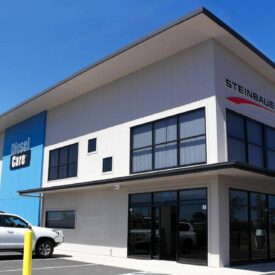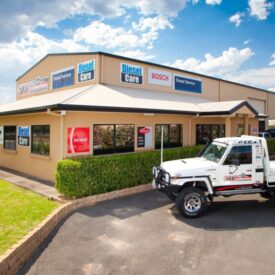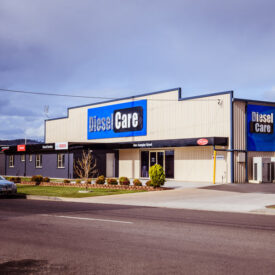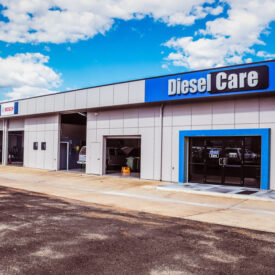-
How much do the kits cost?
They vary depending on the make and model of your vehicle starting from $280.
Search for your vehicle here.
-
Will it suit my vehicle?
All our Fuel Filter Bracket kits have been custom designed to suit a range of specific vehicles Toyota, Nissan, Mazda and more. Unfortunately we don’t have a kit for every make & model but most popular vehicles are covered & our range is expanding continually.
Search for your vehicle here.
-
I’ve heard lots of horror stories about dirty fuel. I have also read stories online by “experts” that a secondary fuel filter system could actually create more problems than what they fix, such as not providing enough fuel flow. Comments?
We have seen some claims by one or two forum experts, one even suggesting the high pressure Common Rail Pump could run dry. This is complete nonsense. In some instances I agree that an inadequate supply causes problems, e.g. some rotary fuel pumps are very sensitive to restriction (Bosch VP44, Denso ECD-3 & ECD-V4).
But in most systems around today, including Common Rail, secondary (final filtration at 2 to 5 micron) is the best thing you could do to increase the life of your fuel system & safeguard against expensive repairs due to fuel contamination.
Some modern vehicles e.g. Toyota, have a restriction indicator to alert the driver if there is a restriction by illuminating a warning light on the dash. A restriction sensor mounted on the factory filter senses any restriction upstream from that point back to the tank, but not a restriction downstream of the sensor, i.e. between the factory filter & the high pressure pump.
In the extremely unlikely case of a secondary filter becoming blocked, the restriction sensor would not detect this, however, the worst thing that could happen by having a reduced fuel flow or restricted supply to the high pressure pump is a loss of engine power, or perhaps a surge. These two symptoms are common when a filter becomes blocked, or possibly if a tank puck-up or tank vent is clogged.
We have never seen a fuel restriction lead to the failure of a Common Rail pump. The evidence that a Secondary Filter will not “create more problems than they fix” is with the tens of thousands of Secondary filters currently fitted to vehicles all over Australia. There have been no pump failures, system damage, or any symptoms whatsoever.
We have saved hundreds from damage & failure from contamination. We have, however, seen hundreds of Common Rail pumps fail due to fuel contamination where no additional fuel filter has been fitted. Enough said.
-
Does the addition of another fuel filter restrict the flow of fuel?
Some unsuitable aftermarket filters may present a flow problem but the Fuel Manager FM100 has more than adequate capacity for all 4WD & SUV diesels available today. The Fuel Manager FM100 is designed for use on common rail fuel systems. The flow rate of the filter assembly with a 2 micron filter is rated at 300 Litres per hour and suitable for engines up to 350hp.
Diesel Care has conducted testing & trials over many years to ensure that our kits don’t cause any problems with regards to fuel supply. We have sold tens of thousands of our kits & have had no reported symptoms of fuel restriction causing loss of performance. If there was any problem in this regard we simply wouldn’t fit them.
See our tests here.
-
What should I do if the Fuel Filter warning light on the dash comes on?
The filter warning light is to alert you that there has been water detected in the sedimenter part of the filter assembly, & in some vehicles it can also warn of a filter that’s becoming blocked, e.g. Toyota has this restriction warning feature.
Whatever the cause, a filter warning light should not be ignored. You should stop & investigate at the first possible opportunity. The first thing to do is drain off some fuel from the filter drain cock. This is positioned at the base of the fuel filter assembly & because water is more dense than diesel, it will be the first liquid to come out.
It’s a good idea to catch what you drain into a receptacle so you can see if water is present, if there is, the warning light should go out once you’ve re-started. This instance of water in the fuel is where a Diesel Care Secondary Filter Kit really pays for itself. i.e. if any water has managed to get past the factory filter it will have been caught in the secondary filter.
If any water has been evident its best to replace the filters. Filters are cheap, water damage is expensive.
-
Where can I buy a replacement filter cartridge?
Replacement cartridges can be purchased from quality Diesel Injection repair shops by quoting the part number on the filter. By quoting the part number you will be sure to fit the correct filter to your particular vehicle.
Filters vary in Micron rating and size, so it’s important to get the right one. We can mail you one if you don’t have an outlet near you, just call 1800 880 150 or purchase online from our diesel-store.
-
How often should the filter be changed?
This depends on which Filter Kit you chose; Primary or Secondary.
Primary filters need changing more often than Secondary because they are filtering fuel straight from the tank, whereas Secondary filters don’t need to be changed very often because they are filtering fuel that’s been through the factory filter. So this is the general rule:
• For Primary filters we recommend you replace the cartridge every 20,000kms.
• For Secondary filters we recommend you replace the cartridge every 40,000kms, or every second time you change your factory filter, whichever comes first.The exception to the above rule would be if you encountered contaminated fuel, in which case you should change the filters early.
-
Could secondary fuel filter systems cause problems to fuel flow?
Some rotary fuel pumps are very sensitive to restriction (Bosch VP44, Denso ECD-3 & ECD-V4). So in instances like this we recommend a primary filtration at 30 micron as the only option.
But most high pressure systems these days including Common Rail are intolerant of contamination & their repair costs are high. Secondary (final) filtration at 2 to 5 micron is the best thing you could do to increase the life of your fuel system & safeguard against expensive repairs due to fuel contamination.
-
Is an additional fuel filter difficult to install?
We have spent many hours developing our products, testing, manufacturing and testing again to ensure that our kits are suitable for the DIY’er. Naturally; some basic skills, some mechanical aptitude, & hand tools are required, along with good old fashioned common sense.
We try to make our instructions as easy to follow & as clear as we can. Even so, if you get stuck with some minor technicality we are happy to help you out over the phone. Our Techs fit our kits all the time & know all the ins & outs so help isn’t far away.
-
Will installing an additional filter kit avoid the vehicle warranty?
Installing a water separator filter kit will not affect warranty as it works in conjunction with the original filter. It does not replace the original filter. There may be some reluctance by some vehicle Dealerships to alter the vehicle from standard but we supply our filter kits to a number of dealerships around the country. The fact is; if you get contamination in your fuel system; there is no warranty.
We recommend you discuss installing an additional filter with your Service Manager, & explore the “what if’s” with regards to fuel contamination damage to your vehicle. A Service Manager with common sense will see that you are far less likely to incur expense with a Diesel Care kit fitted.
-
Are secondary filters connected before the OEM filter to avoid warranty issues?
The secondary filters are fitted after the factory filter, Pre filters are before. We use coarse filtration for Pre (30 micron), much finer filtration for Secondary (2 micron). There should be no problem with warranty as we are not removing the factory filter. We supply both Pre & Secondary configurations to a number of vehicle dealers around the country.
-
Is the secondary kit compatible with the flow rate of a 2010 Toyota Prado GXL engine?
Yes the kit is compatible with the flow rate. The fuel managers are designed for common rail systems. The flow rate on the filter assembly we use with a 2 micron filter is rated at 300 Litres per hour and up to 350hp.
-
Do you deliver the filter kits to PO Boxes?
Yes, the filter kits are sent out in express post bags so they can be sent to a PO Box.
-
Do you accept direct deposit for items purchased through the Diesel Store?
Yes we do take direct deposit. Please contact us and we will supply our bank details.
-
Does the kit include an extra filter?
No, only one filter cartridge comes with the kit however, extra filters can be supplied at an additional cost and can be purchased through our web store or by phoning us on 1800 880 150.
-
There are 2 types available, what’s the difference?
There are two variants for most of the vehicle range we cover; Primary (pre) and Secondary (final).
In short, Primary filters are plumbed before the factory filter and is a relatively course filter rated at 30 microns.
Secondary filters are plumbed after the factory installed filter and is rated at
2 micron or 5 micron, depending on the vehicle.
Read more detailed information on the differences and what we recommend here.
-
How do you inspect and change a fuel filter?
The team at our Dalby branch have put together a short video showing the process on how to check your secondary fuel filter for contamination and demonstrate how simple it is to change.
Watch this video to see how it’s done! An instruction sheet is also provided to download here for you to use.
-
Is the filter easy to replace and maintain?
Notwithstanding the congestion in the engine bay which can make access to filter a bit awkward on some vehicles, the filter cartridge is easy to remove when it’s time to change it.
In fact it can be removed without the need for hand tools thanks to the cartridge retaining nut which can be loosened by hand. Another great feature of the Fuel Manager is that the cartridge can be removed without creating a fuel spill, thanks to the enclosed top on the cartridge.
This great design also extends to the rubber seals being an integral part of the cartridge so you don’t have to worry about replacing fiddly O rings or gaskets.
-
Does your filtration kit fit when there is a dual battery system in place?
Yes, they do fit with a dual battery system fitted in the majority of applications. There are a few exceptions but we do our best to design a kit that fits with commonly fitted under bonnet accessories. We offer a couple of different mounting positions for some vehicles to try & address commonly found space challenges.
-
Why fit an additional fuel filter when there is already a factory filter installed?
You might think that the fuel filter fitted to your car by the manufacturer is adequate protection. Sadly, the truth is often they are not.
The very reason we started developing our filter kits in the first place was because we regularly see damage to diesel pumps & injectors from contamination penetrating the factory fuel filter.
The damage can be catastrophic & expensive so the best defence is to add an auxiliary filter to clean the fuel better & more thoroughly.
-
There are other fuel filter kits out there on the market how is yours different?
• Our kits are the original kits. Our brackets are designed & developed by Diesel Care’s experienced technicians & are all made in Australia using high quality stainless steel. Our bracket designs are so good they are copied, but they are never equalled.
• The Fuel Manger Filter included in the kit is made in the USA and is recognised as one of the highest quality fuel filter systems on the market.
• Diesel Care kits have been developed as both Primary & Secondary options. None of the copy-cats offer both.
• Because we develop the kits, we have the largest range available.
• Expert advice is only a phone call away. Our Technicians are happy to offer advice with the installation or answer any questions you may have.
• Everything is included in the kit to do the job yourself but if you’re pushed for time or just don’t feel like tackling the job, book into one of our stores and we can fit it for you
-
What's included in the Diesel Care Filtration Kit?
Everything is included to do the job!
• FUEL MANAGER Filtration System, designed to efficiently remove particle matter and water from fuel
• Custom designed vehicle specific bracket
• Fuel hose, fittings, clamps and fixing hardware
• Detailed Instructions provided for an easy installationWhat’s not included in the kit?
• General assembly and dismantling tools e.g. spanners, sockets, screwdriver, etc.
Store Locations
Diesel Care Locations in Queensland and New South Wales

Dalby
Queensland

Goondiwindi
Queensland

Tamworth
New South Wales

Toowoomba
Queensland